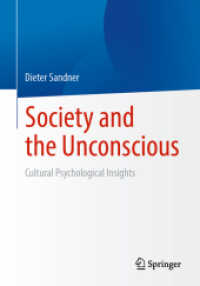- ホーム
- > 洋書
- > 英文書
- > Architecture
Full Description
Winner, Robert Motherwell Book Award, Outstanding Book on Modernism in the Arts, The Dedalus Foundation, 2019
As Latin American elites strove to modernize their cities at the turn of the twentieth century, they eagerly adopted the eugenic theory that improvements to the physical environment would lead to improvements in the human race. Based on Jean-Baptiste Lamarck's theory of the "inheritance of acquired characteristics," this strain of eugenics empowered a utopian project that made race, gender, class, and the built environment the critical instruments of modernity and progress.
Through a transnational and interdisciplinary lens, Eugenics in the Garden reveals how eugenics, fueled by a fear of social degeneration in France, spread from the realms of medical science to architecture and urban planning, becoming a critical instrument in the crafting of modernity in the new Latin world. Journeying back and forth between France, Brazil, and Argentina, Fabiola LÓpez-DurÁn uncovers the complicity of physicians and architects on both sides of the Atlantic, who participated in a global strategy of social engineering, legitimized by the authority of science. In doing so, she reveals the ideological trajectory of one of the most celebrated architects of the twentieth century, Le Corbusier, who deployed architecture in what he saw as the perfecting and whitening of man. The first in-depth interrogation of eugenics' influence on the construction of the modern built environment, Eugenics in the Garden convincingly demonstrates that race was the main tool in the geopolitics of space, and that racism was, and remains, an ideology of progress.
Contents
Acknowledgments
Introduction
Chapter 1. Practicing Utopia: Eugenics and the Medicalization of the Built Environment
Chapter 2. Paris Goes West: From the MusÉe Social to an "Ailing Paradise"
Chapter 3. Machines for Modern Life: The Apparatuses of Health and Reproduction
Chapter 4. Picturing Evolution: Le Corbusier and the Remaking of Man
Epilogue
Notes
Bibliography
Index








